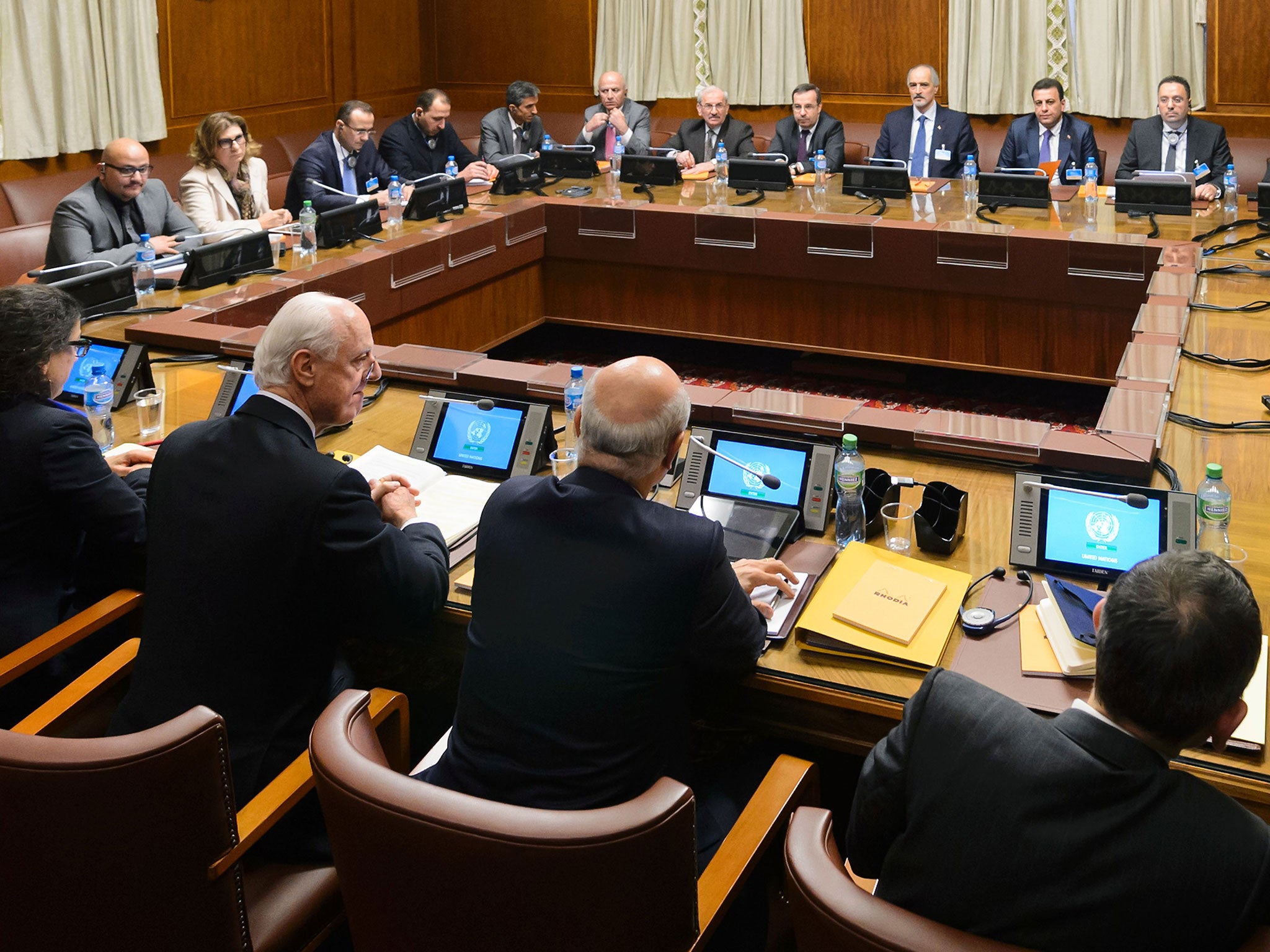Syria talks: Anti-Assad opposition makes demands on prisoners and bombing but Kurds go home
The Syrian opposition has made a number of demands to the Assad regime

Your support helps us to tell the story
From reproductive rights to climate change to Big Tech, The Independent is on the ground when the story is developing. Whether it's investigating the financials of Elon Musk's pro-Trump PAC or producing our latest documentary, 'The A Word', which shines a light on the American women fighting for reproductive rights, we know how important it is to parse out the facts from the messaging.
At such a critical moment in US history, we need reporters on the ground. Your donation allows us to keep sending journalists to speak to both sides of the story.
The Independent is trusted by Americans across the entire political spectrum. And unlike many other quality news outlets, we choose not to lock Americans out of our reporting and analysis with paywalls. We believe quality journalism should be available to everyone, paid for by those who can afford it.
Your support makes all the difference.The Syrian opposition has agreed to enter UN-led peace talks to attempt to end the civil war in Syria. It follows uncertainty as to whether it would attend the Geneva talks, after initially refusing to attend.
The main Syrian opposition, an umbrella organisation known as the Higher Negotiations Committee (HNC), agreed to talks on the condition of the release of 3,000 prisoners held by the Bashar al-Assad government.
The HNC is also demanding an end to the bombing of civilians and improved humanitarian access to some parts of the country. It has threatened to withdraw from the talks if government "crimes" persist, according to Agence France-Presse (AFP) news agency.
The group was assured by the US and UN that its demands would be taken seriously.
The government-run Syrian news agency SANA reported that Syria’s permanent representative to the UN, Bashar al-Jaafari, "affirmed the seriousness of the Syrian government regarding dialogue and finding a political solution for the crisis, a solution that is defined by the Syrian people without any foreign interference."
A list of 177 names of prisoners the HNC want released has already been provided by the HNC to Special Envoy for Syria Staffan de Mistura, according to The Guardian.
"We are trying to push for women with newborn children,” said Farah Atassi, an opposition adviser, to the Guardian. “That’s a priority. Then we will move to the next list.”
The decision to enter peace talks was welcomed by Western leaders. Foreign Secretary Phillip Hammond, welcomed the HNC's "difficult" decision and said:
"Intra-Syrian peace negotiations must deliver a political transition away from Assad and end the suffering of the Syrian people. The UK supports this process and calls for complete and unfettered humanitarian access across Syria, and an end to all violations of international humanitarian law, as set out in UN Security Council Resolution 2254. The UK believes in a Syrian-led political settlement to the conflict and expects both sides to participate in good faith to finally provide the peace the Syrian people deserve."
John Kerry, US Secretary for State, also welcomed the decision, and said: "The United States also reiterates that UN Security Council Resolution 2254 must be fully implemented by all parties to the talks, including with regard to the urgent need for humanitarian access for besieged areas of Syria. The United States further expects that both sides in these negotiations will participate in good faith and achieve early, measurable progress in the days ahead."
UN Security Council Resolution 2254 scheduled the Syrian peace talks for January 2016, and also demands the ending of attacks on civilian targets. Groups designated as 'terrorist', such as Isis and the al-Nusra Front, an al-Qaeda affiliate, are excluded from the peace process.
However, in a setback to a long-term truce, Kurdish representatives have left Switzerland after not receiving invitations to the talks. Though President Putin supports the presence of Kurdish groups in negotiations, their lack of participation in negotiations has been a significant barrier to progress.
Saleh Muslim, head of the Syrian Kurdish Democratic Union Party (PYD), and his entourage left Geneva late on Friday. "We left Geneva because we did not get invitations," an PYD source said to AFP.
He added: "We will not commit to any decision that comes out of Geneva, including a cease fire agreement. Without us, this process will have the same fate as the last round of [failed] Geneva talks"
Ilham Ahmad, the Kurdish co-head of an Arab-Kurdish joint council in Syria left Geneva on Friday after not receiving an invitation to talks, AFP reported.
The HNC, and its Saudi and Turkish supporters, have always strongly objected to the PYD's involvement in peace talks. This means that only representatives of the Assad government and the HNC will meet in Geneva.
Kurdish fighters, including from the YPG, the armed wing of the PYD, have been very successful in fighting Isis. They have also worked with the American military to coordinate airstrikes against the militant group.
Join our commenting forum
Join thought-provoking conversations, follow other Independent readers and see their replies
Comments